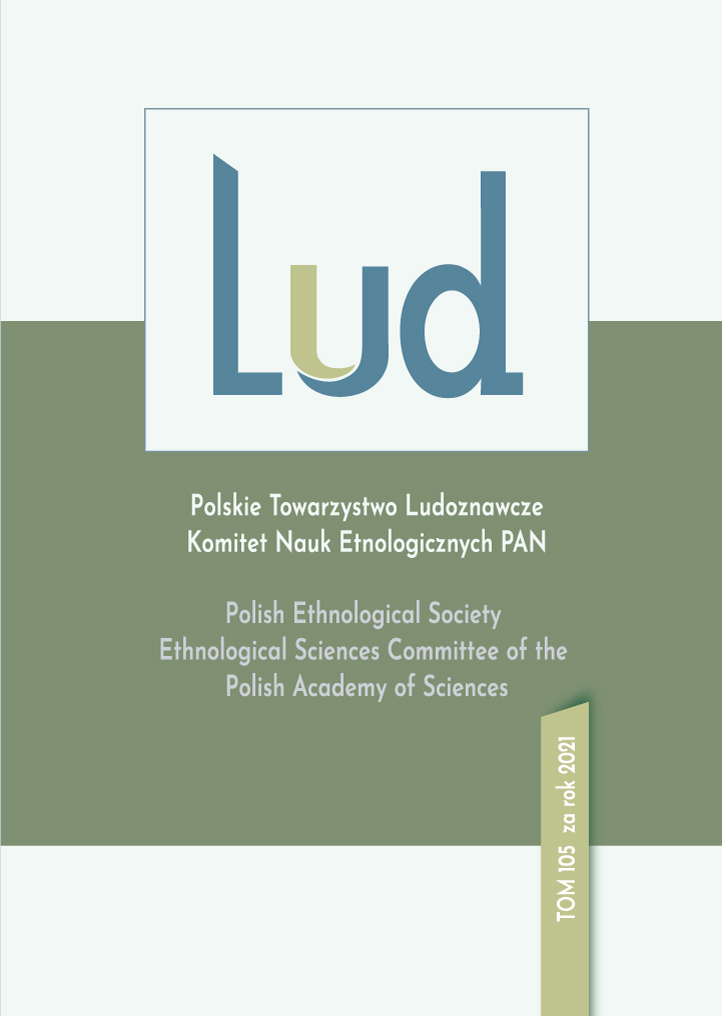„Kosmopolityczne więzi koleżeńskie” i doświadczenie transnarodowości w świecie muzyki klasycznej. Przypadek artystów japońskich
DOI :
https://doi.org/10.12775/lud105.2021.06Mots-clés
kosmopolityczne więzi koleżeńskie, transnarodowa mobilność, przemysły kreatywne, muzyka klasyczna, japońskie muzyczkiRésumé
W globalnym podziale pracy twórczej muzycy japońscy doświadczają nierówności implikowanych przez przynależność etniczno-rasową, wynikającą z przekonania, że zdolność uprawiania autentycznej muzyki klasycznej jest poniekąd genetycznie uwarunkowana. Zgodnie z urasowionym dyskursem zakorzenione w „kulturze zachodniej” klasyczne kompozycje mogą być poprawnie zinterpretowane jedynie przez wykonawców urodzonych i wychowanych w Europie. W literaturze dotyczącej transnarodowości i migracji brakuje studiów analizujących uwarunkowania międzynarodowej mobilności w zawodach artystycznych. Temat mobilności artystycznej napędzanej strukturami nierówności etniczno-rasowych strukturyzujących sektor muzyki klasycznej nie został także podjęty przez badaczy przemysłów kreatywnych/kulturalnych. Celem tego artykułu jest wypełnienie tej luki.
Opierając się na bogatym materiale empirycznym zebranym w trzech lokalizacjach: w Paryżu, Warszawie i Tokio, artykuł ten analizuje doświadczenia zawodowej mobilności wśród japońskich muzyków klasycznych funkcjonujących pomiędzy rodzimymi i europejskimi środowiskami muzycznymi. Analiza koncentruje się z jednej strony na elementach, które napędzają transnarodową mobilność i jednocześnie ją ograniczają. Z drugiej strony pokażę, w jaki sposób japońscy muzycy klasyczni, budując kosmopolityczne więzi koleżeńskie, pokonują bariery związane z rynkiem pracy i restrykcyjnymi politykami migracyjnymi, aby móc kontynuować swoje transnarodowe przedsięwzięcia artystyczne.
Références
Anthias, F. (2007). Ethnic Ties: Social Capital and the Question of Mobilisability. The Sociological Review, 55(4).
Banks, M. (2007). The Politics of Cultural Work. Basingstoke: Palgrave Macmillan.
Banks, M., Hesmondhalgh, D. (2009). Looking for work in creative industries policy. International Journal of Cultural Policy, 15(4): 415-430.
Bauder, H. (2008). Citizenship as Capital: The Distinction of Migrant Labor. Alternatives, 33(3): 315–333.
Beaverstock, J. V. (2002). Transnational Elites in Global Cities: British Expatriates in Singapore's Financial District. Geoforum, 33(4):525-538.
Beech, S. E. (2014). Why place matters. Area, 46(2): 170–177.
Buchowski, M. (2004). Hierarchies of Knowledge in Central-Eastern European Anthropology. The Anthropology of East Europe Review, 22(2): 5–14.
Charmaz, K. (2006). Constructing Grounded Theory: A Practical Guide through Qualitative Analysis. London: Sage.
Cook, N. (2013). Western Music as World Music. W: P. Bohlman (red.), The Cambridge History of World Music (s. 75-100). Cambridge: Cambridge University Press.
Coulangeon, P. (2004). Les Musiciens Interprètes en France. Portrait d’une Profession. Paris: Ministère de la Culture-DEPS.
Coulson, S. (2012). Collaborating in a competitive world: musicians’ working lives and understandings of entrepreneurship. Work, Employment and Society, 26(2): 246–261.
Gans, H. J. (2016). Racialization and racialization research. Ethnic and Racial Studies, 40(3):341-352.
Garnham, N. (2005). From Cultural to Creative Industries. International Journal of Cultural Policy, 11(1): 15–29.
Glick Schiller, N., Basch, L., Szanton Blanc, C. (1995). From Immigrant to Transmigrant: Theorizing Transnational Migration. Anthropological Quarterly, 68(1): 48–63.
Glick Schiller, N., Salazar. N. B. (2012). Regimes of Mobility Across the Globe. Journal of Ethnic and Migration Studies, 39(2): 183-200.
Glick Schiller, N., Tsypylma, D., Gruner-Domic, S. (2011). Defining cosmopolitan sociability in a transnational age. An introduction. Ethnic and Racial Studies, 34(3): 399-418.
Grazian, D. (2003). Blue Chicago: The Search for Authenticity in Urban Blues Clubs. Chicago: University Chicago Press.
Haynes, J. (2013). Music, Difference, and the Residue of Race. London and New York: Routledge.
Herzfeld, M. (2004). The Body Impolitic: Artisans and Artifice in the Global Hierarchy of Value. Chicago, University of Chicago Press.
Hesmondhalgh, D., Saha, A. (2013). Race, Ethnicity, and Cultural Production. Popular Communication 11(3): 179–195.
Iredale, R. (2005). Gender, immigration policies and accreditation: valuing the skills of professional women migrants. Geoforum, 36(2):155–166.
Kowalczyk, B. M. (2021). Transnational musicians. Precariousness, Ethnicity and Gender in the Creative Industry. Abington: Routledge.
Leppänen, T. (2015). The west and the rest of classical music: Asian musicians in the Finnish media coverage of the 1995 Jean Sibelius Violin Competition. European Journal of Cultural Studies, 18(1): 1–16.
Marcus, G. E. (1998). Ethnography through Thick and Thin. Princeton: Princeton University Press.
McCormick, L. (2015). Performing Civility. International Competitions in Classical Music. Cambridge: Cambridge University Press.
Menger, P. (1999). Artistic Labor Markets and Careers. Annual Review of Sociology, 25: 541–574.
Radano, R. M., Bohlman, P. V. (2000). Introduction: Music and race, their past, their presence. W: R. M. Radano, Bohlman, P. V. (red.) Music and the Racial Imagination, (1-53). Chicago, IL: The University of Chicago Press.
Scharff, C. (2018). Gender, Subjectivity, and Cultural Work: The Classical Music Profession. Abington: Routledge.
Taguieff, P. (1988). La France du préjugé: essai sur le racisme et ses doubles. Paris, La Découverte.
Wagner, I. (2015). Producing Excellence: The Making of Virtuosos. New Brunswick, Rutgers University Press.
Waters, M. C., Jiménez, T. R. (2005). Assessing Immigrant Assimilation: New Empirical and Theoretical Challenges. Annual Review of Sociology, 31(1): 105–125.
Yang, M. (2007). East Meets West in the Concert Hall: Asians and Classical Music in the Century of Imperialism, Post-Colonialism, and Multiculturalism. Asian Music, 38(1): 1–30.
Yoshihara, M. (2007). Musicians from a Different Shore: Asians and Asian Americans in Classical Music. Philadelphia: Temple University Press.
Yuval-Davis, N., Wemyss, G., Cassidy, K. (2018). Everyday Bordering, Belonging and the Reorientation of British Immigration Legislation. Sociology, 52(2), 228–244.
Téléchargements
Publiée
Comment citer
Numéro
Rubrique
Licence
© LUD. Organ Polskiego Towarzystwa Ludoznawczego i Komitetu Nauk Etnologicznych PAN 2021

Ce travail est disponible sous licence Creative Commons Attribution - Pas de Modification 4.0 International.
1. Autorzy udzielają wydawcy (Polskiemu Towarzystwu Ludoznawczemu) licencji niewyłącznej na korzystanie z utworu w następujących polach eksploatacji:
- utrwalanie Utworu/przedmiotu prawa pokrewnego;
- reprodukowanie (zwielokrotnienie) Utworu/przedmiotu prawa pokrewnego drukiem i techniką cyfrową (ebook, audiobook);
- wprowadzania do obrotu egzemplarzy zwielokrotnionego Utworu/przedmiotu prawa pokrewnego;
- wprowadzenie Utworu/przedmiotu prawa pokrewnego do pamięci komputera;
- rozpowszechnianie utworu w wersji elektronicznej w formule open access na licencji Creative Commons (CC BY - ND 4.0).
2. Autorzy udzielają wydawcy licencji nieodpłatnie.
3. Korzystanie przez wydawcę z utworu na ww. polach nie jest ograniczone czasowo, ilościowo i terytorialnie.
Stats
Number of views and downloads: 760
Number of citations: 0



